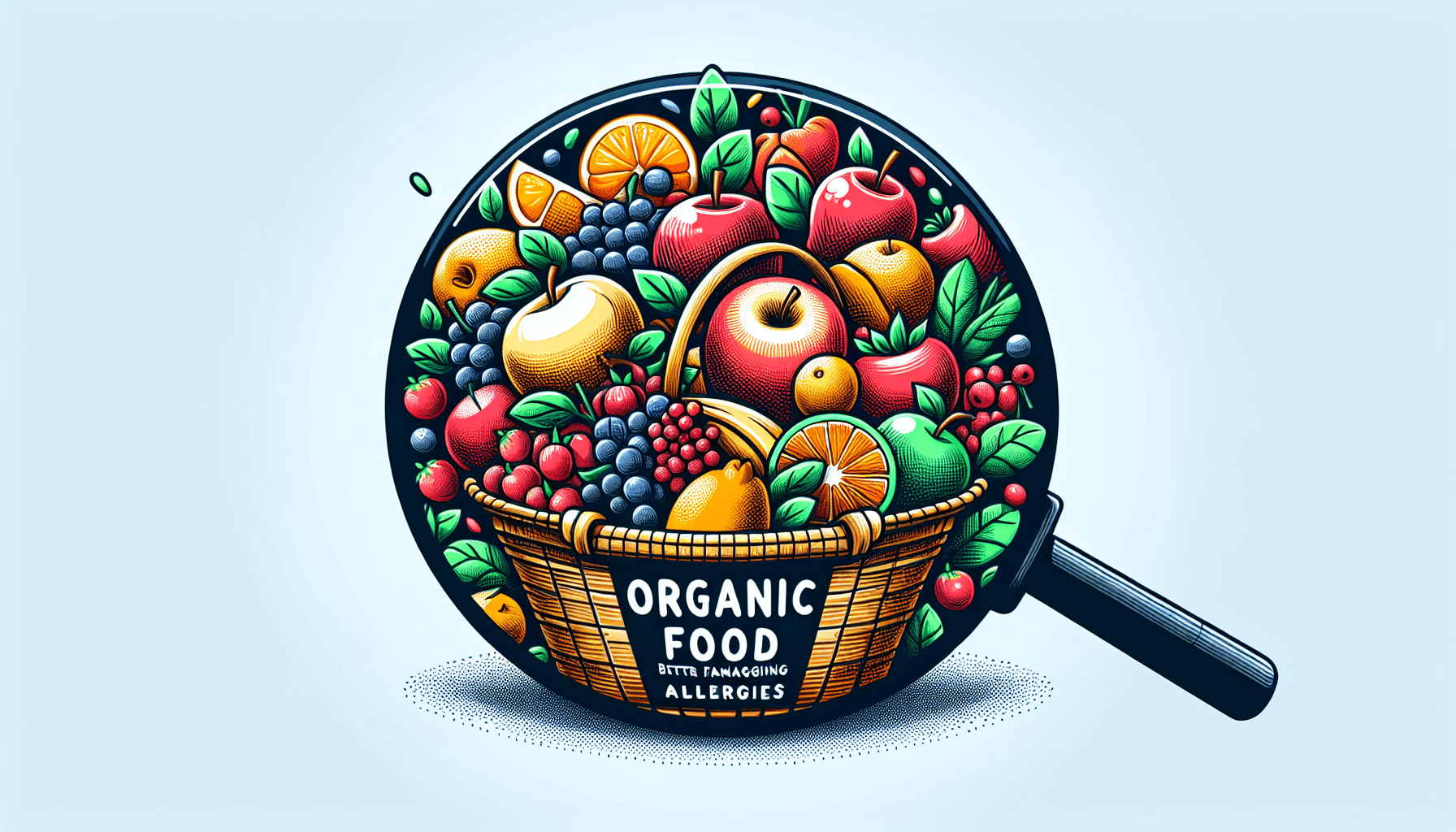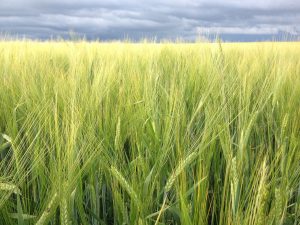Welcome to our exploration of whether organic food truly holds the key to better allergy management. As we navigate the complex world of allergens, chemicals, and dietary choices, we aim to uncover whether organic food can provide the relief many allergy sufferers seek. Join us as we delve into the potential benefits of organic options, and examine whether they can make a significant difference in our lives. Have you ever wondered if switching to organic food could help manage your allergies better? Many of us are constantly in search of ways to improve our health and well-being, and for those of us dealing with allergies, finding effective means of management is a top priority. In recent years, organic food has gained significant attention for its potential health benefits. But is it truly better for those of us who struggle with allergies?
Understanding Allergies
Before we delve into the specifics of organic food and its implications for allergy sufferers, it’s important to understand what allergies are and how they affect our bodies. Allergies occur when our immune system reacts to a foreign substance—such as pollen, bee venom, pet dander, or certain foods—that doesn’t cause a reaction in most people. Our immune system produces substances known as antibodies. When we have allergies, our immune system makes antibodies that identify a particular allergen as harmful, even though it isn’t. When we come into contact with the allergen, our immune system’s reaction can inflame our skin, sinuses, airways, or digestive system.
Common Types of Allergies
Allergies manifest in various forms, and understanding the common types can help us better manage them. Here are some of the most common allergies many of us face:
| Allergy Type | Description | Common Triggers |
|---|---|---|
| Food Allergies | Immune system reaction to certain foods. | Peanuts, tree nuts, milk, eggs, shellfish, soy, wheat |
| Respiratory Allergies | Immune response to airborne substances. | Pollen, dust mites, mold spores, pet dander |
| Skin Allergies | Immune reaction causing skin inflammation. | Latex, nickel, insect stings, certain plants |
| Drug Allergies | Adverse reaction to certain medications. | Penicillin, aspirin, certain antibiotics |
| Seasonal Allergies | Often referred to as hay fever. | Seasonal pollen from trees, grasses, and weeds |
Each type of allergy has its own set of symptoms and triggers, and managing them often requires a combination of avoidance, medication, and lifestyle adjustments.
What is Organic Food?
To understand the potential benefits of organic food for allergy management, we first need to get a clear picture of what organic food actually is. Organic food refers to products that are grown, processed, and handled according to specific standards set by national organic programs. Organic farming practices are designed to encourage soil and water conservation and reduce pollution.
Key Characteristics of Organic Food
Organic food is notable for several key characteristics which differentiate it from conventionally produced food:
| Characteristic | Description |
|---|---|
| No Synthetic Pesticides | Organic food is grown without the use of synthetic herbicides, pesticides, and fertilizers. |
| No Genetically Modified Organisms (GMOs) | Organic standards prohibit the use of GMOs in farming. |
| Natural Farming Techniques | Organic farming practices emphasize the use of renewable resources and conservation of soil and water. |
| Animal Welfare | Organic livestock are raised with access to the outdoors and are fed organic feed, without the use of antibiotics or growth hormones. |
These stringent guidelines are designed to ensure that organic food is produced in a manner that’s better for both human health and the environment.

Can Organic Food Help Manage Allergies?
We come to the heart of our discussion: can organic food help manage our allergies more effectively than conventional food? The answer isn’t entirely straightforward, but there are several aspects to consider.
Reduced Exposure to Pesticides
One of the chief benefits touted by advocates of organic food is the reduced exposure to synthetic pesticides. Conventional farming often relies on pesticides to protect crops from pests and diseases, and residues of these chemicals can remain on produce. Some studies have suggested that exposure to certain pesticides may worsen allergy symptoms or even contribute to the development of allergies.
Pesticide Residue and Allergies
Research has shown that long-term exposure to pesticides may be linked to an increased risk of developing allergic conditions, such as asthma. Switching to organic foods can reduce our exposure to these pesticide residues, potentially leading to fewer allergic reactions. For individuals who are particularly sensitive to chemicals, this reduction in pesticide exposure may alleviate some of their allergy symptoms.
Nutrient Content in Organic Food
Another point to consider is the nutrient content of organic foods. Some studies suggest that organic produce may have higher levels of certain nutrients, such as antioxidants, which can help boost our immune system. A stronger immune system might be better at handling allergens, potentially reducing the severity of allergic reactions.
Antioxidant Levels
Antioxidants are compounds that protect our cells from damage caused by free radicals. Higher levels of antioxidants in organic foods might help reduce inflammation in our bodies, which could be beneficial for managing allergy symptoms.
| Nutrient | Potential Benefit for Allergies | Organic Food Sources |
|---|---|---|
| Vitamin C | Reduces histamine levels and acts as an antioxidant | Citrus fruits, berries, bell peppers, leafy greens |
| Omega-3 Fatty Acids | Anti-inflammatory properties | Flaxseeds, chia seeds, walnuts, fatty fish |
| Flavonoids | Anti-inflammatory and immune-boosting properties | Apples, onions, chocolate, tea |
However, it’s important to note that the differences in nutrient content between organic and conventional foods can be relatively small and may not be significant enough to result in noticeable improvements in allergy symptoms for everyone.
Avoiding Additives and Preservatives
Many processed foods contain additives and preservatives, some of which can trigger allergic reactions or exacerbate existing allergies. Organic foods tend to have fewer additives and preservatives, which can make them a safer choice for those of us with sensitivities.
Common Additives and Their Potential Effects
| Additive | Potential Allergic Reactions | Common Food Sources |
|---|---|---|
| Artificial Colors | Skin rashes, hyperactivity | Candies, beverages, processed snacks |
| Monosodium Glutamate (MSG) | Headaches, swelling, asthma symptoms | Savory snacks, soups, seasonings |
| Sulfites | Respiratory distress, hives | Dried fruits, wine, processed meats |
By choosing organic products, we can minimize our intake of these potentially problematic additives, potentially leading to fewer allergy flare-ups.
Personal Experiences and Anecdotal Evidence
In addition to scientific research, many people report personal success stories related to managing their allergies by switching to an organic diet. While these anecdotal accounts are not a substitute for rigorous scientific evidence, they can provide insight into potential benefits.
Real-life Stories
Many individuals have shared their experiences of reduced allergy symptoms after transitioning to an organic diet. These stories highlight possible improvements in respiratory function, skin condition, and overall well-being. While personal experiences are subjective, they can be powerful motivators for others to try similar approaches.
The Placebo Effect
It’s also important to consider the placebo effect, where the belief that a particular change will improve our condition actually leads to perceived or real improvements. In some cases, the benefits people experience from switching to organic food might be partly attributed to their belief in the benefits of organic products, rather than the products themselves.

Scientific Studies and Research
Scientific research provides a more objective perspective on the relationship between organic food and allergy management. Several studies have investigated various aspects of this topic, yielding a mix of results.
Pesticide Exposure Studies
One notable study published in “Environmental Health Perspectives” found that people who consumed organic fruits and vegetables had lower levels of pesticide metabolites in their urine compared to those who consumed conventionally grown produce. While this suggests reduced pesticide exposure, the study did not directly link this reduction to improvements in allergy symptoms.
Nutritional Comparisons
Other studies have compared the nutritional content of organic and conventional foods. A meta-analysis of multiple studies published in the “British Journal of Nutrition” concluded that organic crops contain higher concentrations of antioxidants and lower levels of cadmium and pesticide residues. However, the review acknowledged significant variability in the results, indicating that more research is needed to draw definitive conclusions.
Impact on Allergies
Research specifically focusing on allergies is relatively limited. While some studies suggest that organic diets may help reduce the risk of developing allergies in children, evidence for adults is less clear. A study in the “Journal of Allergy and Clinical Immunology” found that children who consumed organic dairy products had a lower risk of developing eczema and wheezing, but the study did not find a significant impact on other allergic conditions.
Practical Considerations for Switching to Organic Food
Deciding to switch to an organic diet involves several practical considerations, including cost, availability, and personal preferences. Understanding these factors can help us make informed decisions about whether organic food is the right choice for our allergy management.
Cost and Accessibility
One of the main barriers to adopting an organic diet is cost. Organic products are often more expensive than their conventional counterparts due to more labor-intensive farming practices and higher production costs. However, there are ways to manage these costs:
- Buying in Bulk: Purchasing organic foods in bulk can reduce the per-unit cost.
- Seasonal Shopping: Buying seasonal produce can be cheaper and fresher.
- Local Farmers’ Markets: Supporting local organic farmers can be more cost-effective and promotes local agriculture.
Availability
While organic products are becoming more widely available, they may still be less accessible in certain areas, particularly in rural or economically disadvantaged communities. Online retailers and community-supported agriculture (CSA) programs can help bridge this gap by delivering organic products directly to our doorsteps.
Personal Preferences
Taste, texture, and dietary preferences also play a role in our decision to switch to organic foods. Some people find that organic produce has a richer flavor, while others may not notice a significant difference. Personal experiences can vary, and it’s important to choose foods that we enjoy and can sustain in the long term.
Gradual Transition
For those of us considering a switch to organic food, a gradual transition can make the process more manageable. Starting with a few key organic items and gradually expanding our selection can help us adjust to any dietary and financial changes.

Tips for Incorporating Organic Foods into Our Diet
Whether we decide to fully embrace organic eating or selectively incorporate organic products, there are several strategies that can help us get started:
Prioritizing High-Risk Foods
Some foods are more likely to contain higher levels of pesticides and other chemicals. Focusing on high-risk foods can provide a greater impact on reducing our exposure. The Environmental Working Group (EWG) publishes an annual list of the “Dirty Dozen,” which includes fruits and vegetables with the highest pesticide residues.
Growing Our Own Produce
Another cost-effective way to incorporate organic foods is to grow our own produce. Even with limited space, container gardening or indoor herb gardens can provide us with fresh, organic produce year-round.
Reading Labels
When shopping for organic products, reading labels can help us make informed choices. Key certifications to look for include:
- USDA Organic: Products with this label meet national organic standards.
- Non-GMO Project Verified: Ensures products are made without genetically modified organisms.
- Certified Humane: Indicates humane treatment of farm animals.
Cooking at Home
Preparing meals from scratch using organic ingredients allows us to have complete control over what goes into our food. Home-cooked meals often contain fewer additives and preservatives, making them a healthier option for managing allergies.
Exploring Organic Alternatives
There are many organic alternatives to common allergenic foods. For example, those of us with dairy allergies can try organic almond milk or coconut milk. Organic gluten-free grains like quinoa and buckwheat can be good options for those with wheat allergies.
Conclusion
While the evidence for organic food as a superior option for managing allergies is not definitive, there are several potential benefits that make it worth considering. Reduced pesticide exposure, higher nutrient content, and fewer additives and preservatives can contribute to overall better health, which may indirectly help in managing allergy symptoms.
Each of us is unique, and what works for one person might not work for another. It’s important to listen to our bodies, consult healthcare professionals, and make choices based on both scientific evidence and personal experiences. Whether we choose to fully embrace organic eating or selectively incorporate organic products, our focus should always be on creating a balanced, enjoyable, and sustainable diet that supports our health and well-being.
Is organic food better for managing allergies? The answer may vary for each of us, but exploring the potential benefits and making informed choices can lead us to a healthier, happier life.




